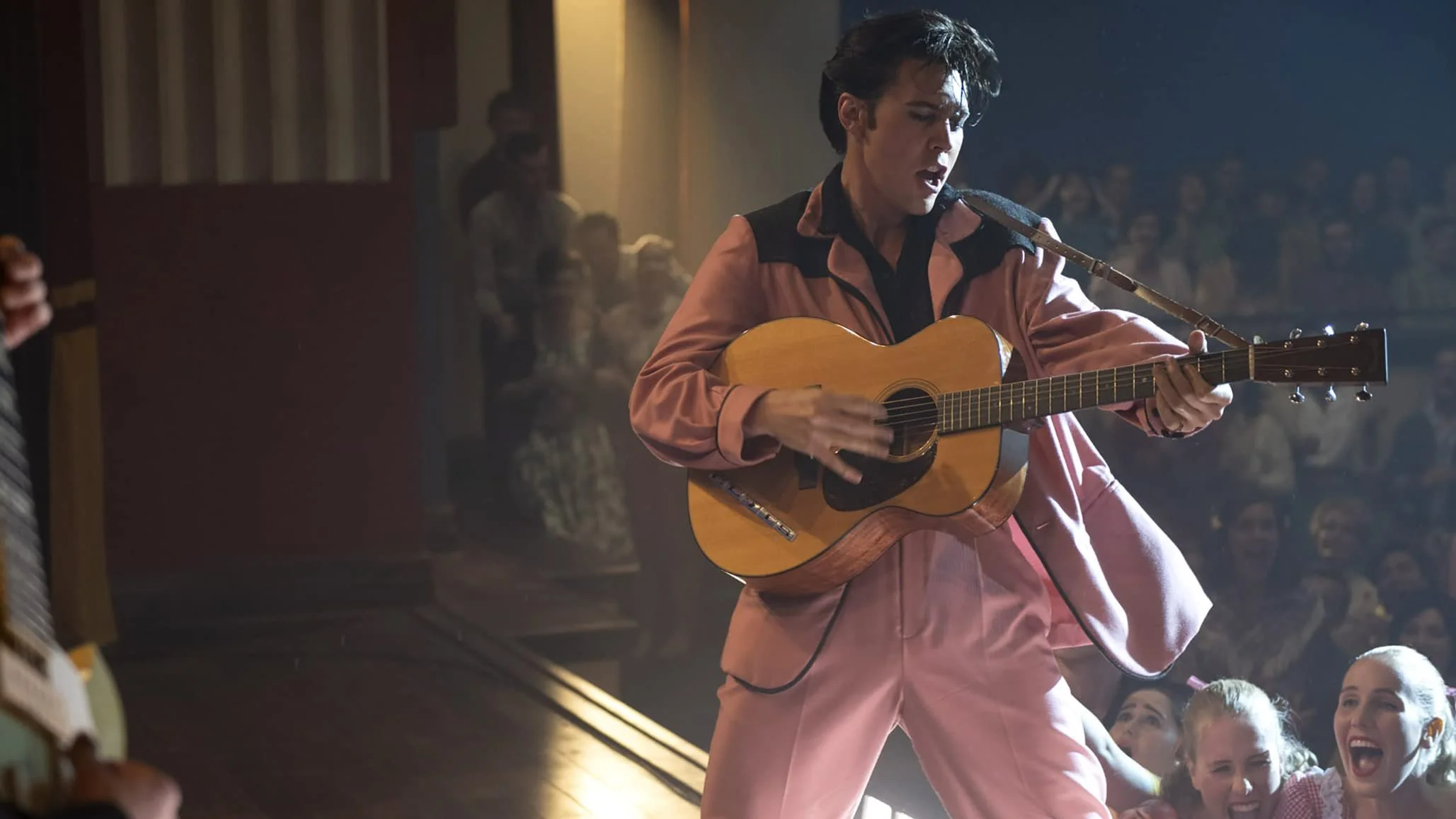Elvis
Directed by Baz Luhrmann
Running time: 2hr40 | REVIEWED BY GUY LODGE
Austin Butler stars in Elvis
If you somehow — who can say why, but somehow — go into a Baz Luhrmann-directed biopic of Elvis Presley hoping for tasteful restraint, the first significant performance scene of Elvis will quickly adjust those expectations for you. Played by a lacquered, libidinous Austin Butler, the 19-year-old Presley slopes onto the stage at the Louisiana Hayride, clad in a bubblegum-pink suit and black lace shirt, dripping eyeliner and charisma and nerves. A bemused audience of white Southern squares stares back at him before, with a yowling “weeeeeeellllll,” he launches into “Baby Let’s Play House” and all hell breaks loose — not just in the film’s world, but in Luhrmann’s bright, saturated mise-en-scène. Presley’s jangling guitar turns to anachronistic hard-rock screeching; the audience’s screams are layered into a sonic wave of Grand Guignol horror; Mandy Walker’s camera bucks and thrashes like a rodeo bull, while remaining fixated in close-up on the pink-polyester bullseye of Presley’s era-defining crotch.
It’s blaringly, rudely, entirely too much — but then, to a mainstream midcentury America not yet braced for the age of the teenager, Elvis was all those things: a sinister, sexy violation, a nuclear explosion of bad taste, a walking headache. Luhrmann’s unapologetically, even proudly gaudy film isn’t as much concerned with telling its subject’s life story — which it does in fairly standard bullet-point fashion — as with channelling his aura and imprint on a culture that didn’t already take sex-selling pop for granted. Anyone can read a Wikipedia page; the rarely-fulfilled point of the celebrity biopic, in my view, is to conjure some tactile, sensual sense of the person, not least for audiences who don’t remember them first-hand.
I find myself enthralled by Elvis on that basis, even when its brash aesthetic choices and loopy structural schemes — notably, the miscalculated framing perspective of Presley’s Mephistophelean manager Col. Tom Parker, played by a fat-suited and frankly overripe Tom Hanks — don’t land. Because, rather like Elvis himself in his curtailed but crammed career, the film keeps trying new tricks in a frenzied drive to connect with an audience, to keep the show running, on or off the rails. Luhrmann has never been a filmmaker shy of montage, but he gives over the vast bulk of this lengthy film to that technique, portraying the public Elvis roadshow as a relentlessly darting, cutting, reassembling campaign of personality, fizzily diverting attention away from the frail person inside the rhinestone-encrusted suit.
Does the film ever get to the “real” Elvis? Sort of: Butler, in a surely star-making performance, is affecting when the lights go down and the film sporadically lets him breathe. Or gasp for air. But this a portrait of celebrity, not of humanity, or at least of the glittery liminal space where those concepts clash and tussle for dominance. Luhrmann’s regular detractors will call Elvis superficial, but the shiny, spangly surfaces are the point here: it’s a thrilling gilded cage of a biography, one that shows — with equal parts empathy and obsessive, starry-eyed fascination — how its subject got caught in that trap.
ELVIS (2022) Written by Baz Luhrmann, Sam Bromell, Craig Pearce, Jeremy Doner | Shot by Mandy Walker | Edited by Jonathan Redmond, Matt Villa
In cinemas now.
